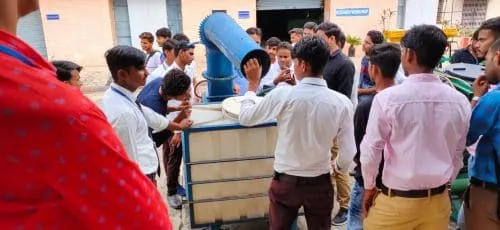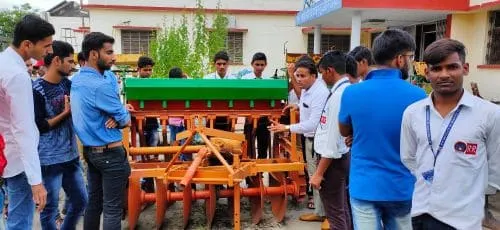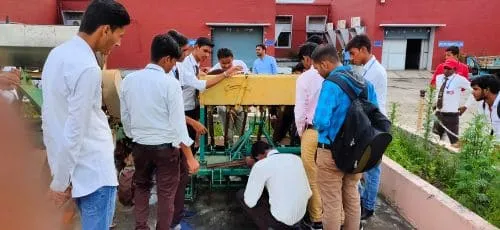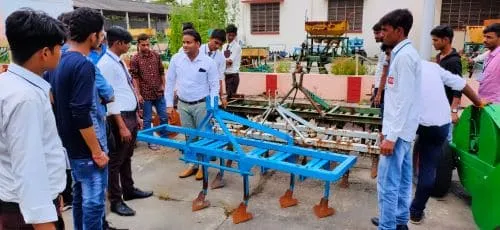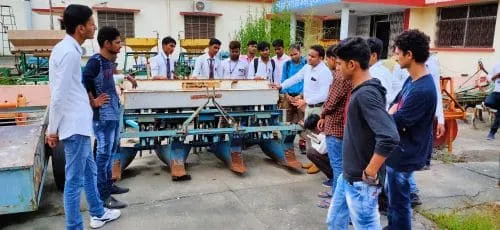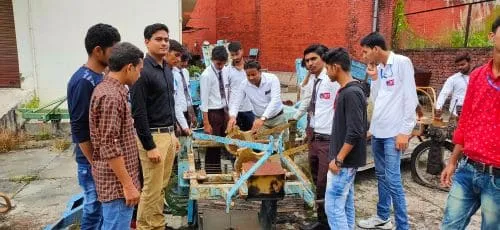gricultural engineering refers to the discipline of engineering that analyses & improves agricultural production and processing. B. Tech Agricultural Engineering Colleges in Lucknow and beyond an attempt to combine mechanical, civil, electrical, and chemical engineering principles mixed with a knowledge of agricultural practices devised according to technological principles. A primary objective of Agriculture Engineering is to improve the efficacy and sustainability of agricultural practices.
Agricultural engineers try to resolve agricultural issues borne out of power supplies, the use of structures and facilities, the efficiency of machinery, the storage and processing of agricultural products and various pollution and environmental issues. Both Government & Private Agriculture Engineering Colleges in U.P. strive to produce agricultural engineers capable of resolving these issues efficiently.
Vision
To become prominent and pioneer in the field of agriculture engineering by imparting sound knowledge & its applications to solve real-life challenges along with the incorporation of Indian values and professional ethics.
Mission
- To provide basic knowledge of agricultural engineering along with tools and techniques to solve problems in an innovative way.
- To promote the use of emerging technologies with versatile approach to enhance entrepreneurship and employability skills.
- To inculcate leadership skills, ethics and Indian values with a passion for lifelong learning.
Program Educational Objectives (PEOs)
- Graduate will be motivated for higher education, research & professional career with profound knowledge and complete devotion for eco-friendly approach.
- Graduate will apply knowledge for innovative solutions to solve the societal problems with available resources.
- Graduate will follow ethical principles along with Indian values to demonstrate high engineering practices.
Program Outcome (POs)
Apply the knowledge of mathematics, science, engineering fundamentals, and an engineering specialization to the solution of complex engineering problems.
Identify, formulate, review research literature, and analyse complex engineering problems reaching substantiated conclusions using first principles of mathematics, natural sciences, and engineering sciences.
Design solutions for complex engineering problems and design system components or processes that meet the specified needs with appropriate consideration for the public health and safety, and the cultural, societal, and environmental considerations.
Use research-based knowledge and research methods including design of experiments, analysis and interpretation of data, and synthesis of the information to provide valid conclusions.
Create, select, and apply appropriate techniques, resources, and modern engineering and IT tools including prediction and modelling to complex engineering activities with an understanding of the limitations.
Apply reasoning informed by the contextual knowledge to assess societal, health, safety, legal and cultural issues and the consequent responsibilities relevant to the professional engineering practice.
Understand the impact of the professional engineering solutions in societal and environmental contexts, and demonstrate the knowledge of, and need for sustainable development.
Apply ethical principles and commit to professional ethics and responsibilities and norms of the engineering practice.
Function effectively as an individual, and as a member or leader in diverse teams, and in multidisciplinary settings.
Communicate effectively on complex engineering activities with the engineering community and with society at large, such as, being able to comprehend and write effective reports and design documentation, make effective presentations, and give and receive clear instructions.
Demonstrate knowledge and understanding of the engineering and management principles and apply these to one’s own work, as a member and leader in a team, to manage projects and in multidisciplinary environments.
Recognize the need for, and have the preparation and ability to engage in independent and life-long learning in the broadest context of technological change.
PROGRAM SPECIFIC OUTCOME (PSOs)
- The ability to use theoretical and practical knowledge of Farm Machinery, Irrigation and Soil Water Conservation principles to maximize agricultural production.
- The ability to design and develop agricultural centric techniques to meet the desired needs of farming systems.
FACULTY OF Agricultural Engineering

LOKESH YADAV
HOD
M.Tech.

SANDEEP KUMAR
ASST PROFESSOR
M.Tech.

VIKAS KUMAR
ASST PROFESSOR
M.Tech.

SUMIT KUMAR
ASST PROFESSOR
M.Tech.

AMIT KUMAR SINGH
ASST PROFESSOR
M.Tech.

SHIVAM VERMA
ASST PROFESSOR
M.Tech.

SARVADA NAND
ASST PROFESSOR
M.Tech.
Duties of A Agricultural Engineer
Agricultural engineers typically perform the following tasks:
- Use computer software to design equipment, systems, or structures
- Modify environmental factors that affect animal or crop production, such as airflow in a barn or runoff patterns on a field
- Test equipment to ensure its safety and reliability
- Oversee construction and production operations
- Plan and work together with clients, contractors, consultants, and other engineers to ensure effective and desirable outcomes
- Agricultural engineers work in farming, including aquaculture (farming of seafood), forestry, and food processing. They work on a wide variety of projects. For example, some agricultural engineers work to develop climate control systems that increase the comfort and productivity of livestock whereas others work to increase the storage capacity and efficiency of refrigeration. Many agricultural engineers attempt to develop better solutions for animal waste disposal. Those with computer programming skills work to integrate artificial intelligence and geospatial systems into agriculture. For example, they work to improve efficiency in fertilizer application or to automate harvesting systems.
In line with its position among the Top B.Tech colleges in Lucknow, RRIMT provides extraordinary faculty and facility assistance to our students and attempts to produce engineers that leave a lasting impact on the industry as a whole – providing tough competition to any graduate from a government or private engineering college in UP.
The laboratories established by the department are as follows:
- Farm Machinery Lab
- Basic Electronics & Instrumentation Lab
- Theory of Machine Lab
- Electrical Circuits Lab
- Soil Mechanics Lab
- Farm Power Lab
- Strength of Material Lab
- Irrigation Engg. Lab
- Drainage Engg. Lab
- Dairy & Food Engg. Lab
- Ground Water, Well & Pump Engg. Lab
- Soil & Water Conservation Engg. Lab
- Tractor System & Control Lab
- Crop Process Engg. Lab
